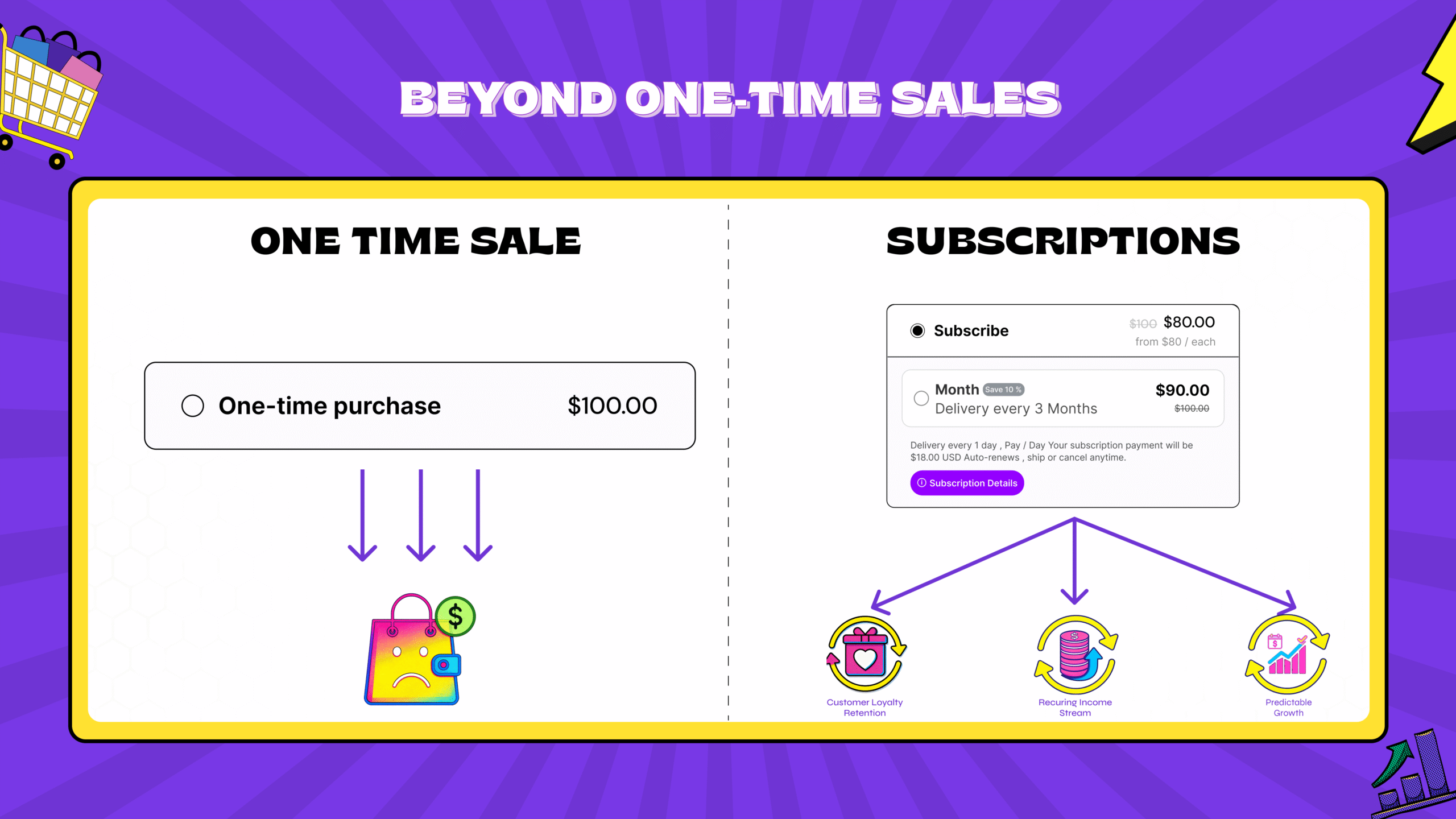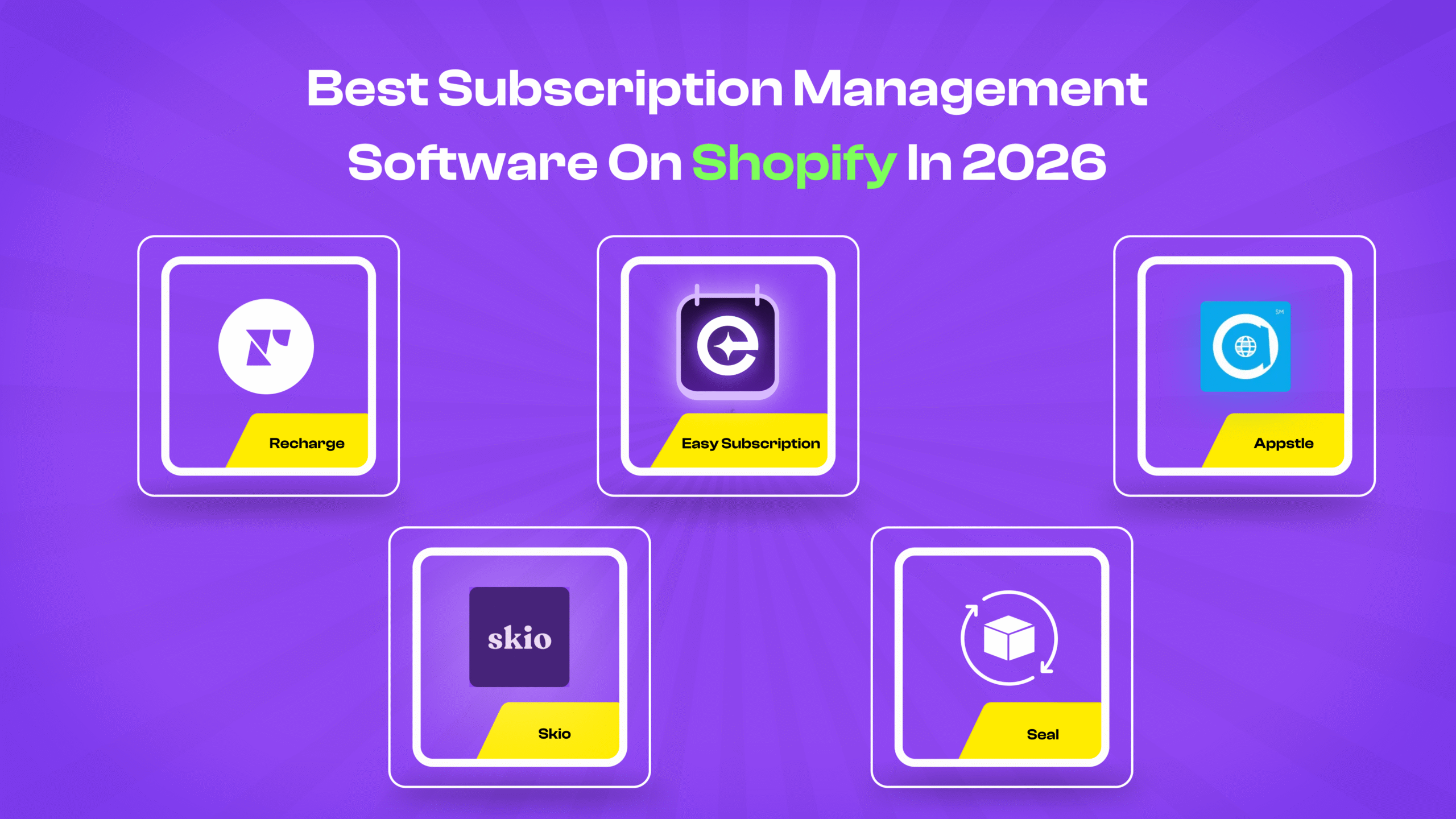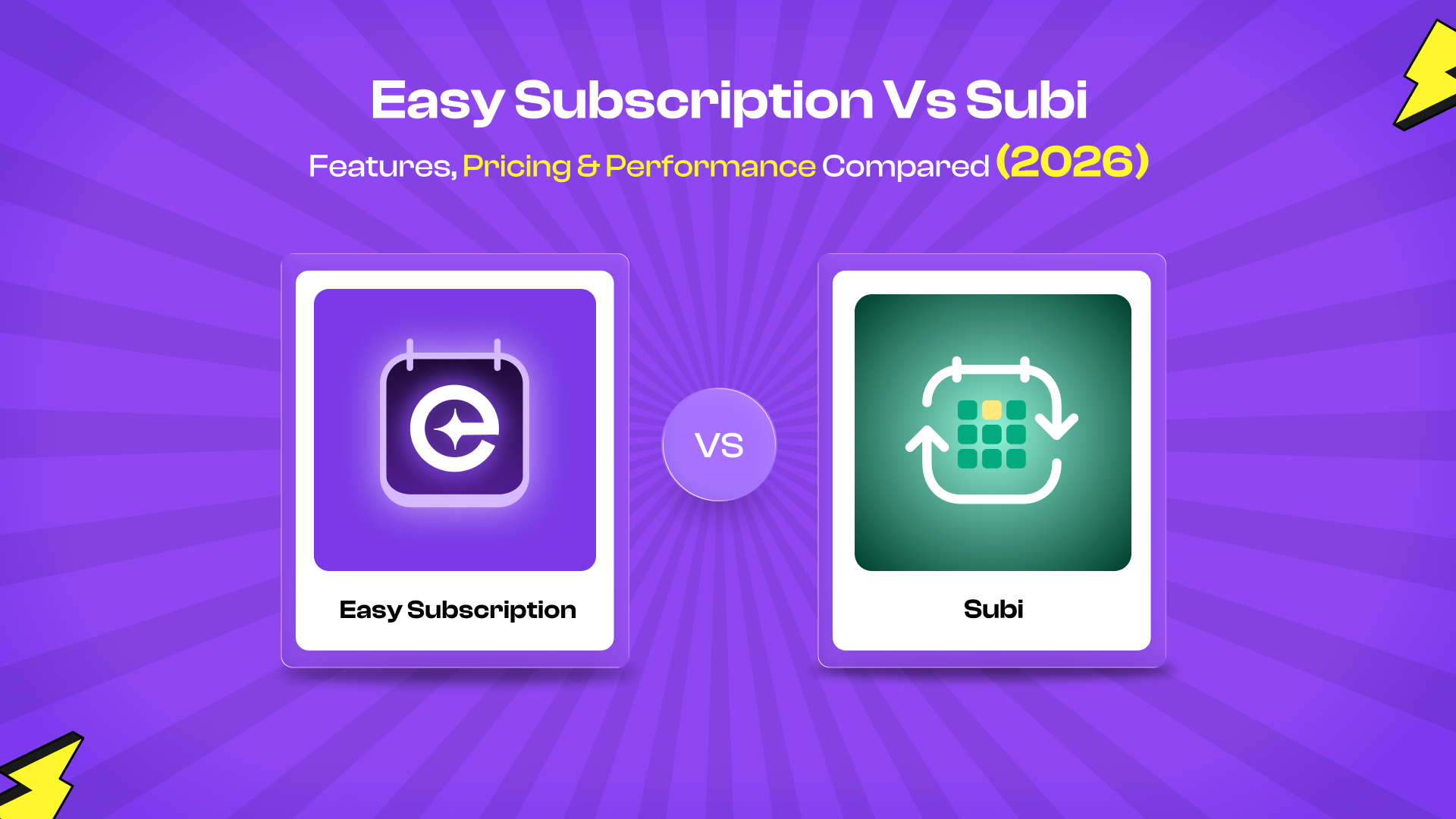
Beyond One-Time Sales—How Shopify Brands Build Predictable Revenue with Subscriptions
Published On: October 31, 2025 - 5 min read
For many Shopify merchants, the game has always been: make a sale, then try to make another. But in 2025, that approach is no longer sustainable. Ad costs are rising, consumer trust is harder to earn, and retention is the new growth channel.
A smarter path: shift from one-time purchases to subscriptions that build predictable recurring revenue.
This pivot isn’t just trendy—it’s strategic. It drives higher customer lifetime value (LTV), reduces churn, stabilizes cash flow, and creates a consistent revenue base for merchants to scale sustainably.
According to Shopify’s Q1 2025 financial report, the platform’s Monthly Recurring Revenue (MRR) hit USD 151 million, a 23% growth YoY. Globally, the subscription e-commerce market is expected to reach USD 20.58 billion by 2025, growing at a nearly 9.4% annual rate. This confirms one thing: subscription commerce is not a passing wave—it’s the future of eCommerce.
If you want to make subscriptions your growth engine, you’ll need the right strategy, metrics, and tools—starting with the right Shopify app.
Why Subscriptions Are the Future of Shopify Commerce
1. Higher Lifetime Value (LTV)
When a customer subscribes, they’re committing to repeat purchases—often automatically. That recurring relationship increases LTV and reduces your dependence on constant new-customer acquisition.
Instead of spending more on paid ads to chase one-off sales, you can focus on nurturing existing subscribers who already trust your brand. Even small improvements in retention can significantly increase profitability, especially when compounded across subscription cohorts.
2. Predictable Cash Flow & Smarter Inventory Planning
Recurring orders make revenue more predictable. You can forecast demand, plan your inventory, and avoid both overstocking and stockouts—common issues that eat into profit margins.
This predictability is especially powerful during Black Friday/Cyber Monday (BFCM) or seasonal peaks when inventory precision matters most. Subscription data helps you make informed purchasing decisions, freeing up working capital for growth.
3. Lower Churn vs. Acquisition Risk
Customer acquisition costs (CAC) continue to climb. Studies show that acquiring a new customer can cost up to 7× more than retaining an existing one.
Subscription commerce shifts your focus from transactional selling to relationship-driven growth. With flexible billing, personalized offers, and continuous engagement, your churn rate drops—protecting long-term profitability even in competitive markets.
4. Stronger Brand Loyalty and Engagement
Subscribers aren’t just buyers—they’re community members. They experience the convenience of automatic deliveries, the habit of regular use, and the familiarity of your brand’s presence in their routine.
These touchpoints make renewals almost frictionless. Over time, subscribers become brand advocates—driving organic growth through referrals, reviews, and social sharing.
5. Perfect Fit for Replenishables and Consumables
Subscriptions are ideal for products that customers already buy repeatedly: coffee, skincare, pet food, supplements, household essentials, and more.
By turning these regular purchases into automated deliveries, you create value for both sides—your customers enjoy convenience, and you secure predictable recurring revenue.
The Key Metrics You Must Track
Running a subscription business goes beyond tracking total subscribers. To build and sustain growth, monitor these critical metrics:
- Active Subscriptions—Total live contracts, including paused or skipped ones.
- New Subscriptions—Contracts started in a given time frame.
- Canceled Subscriptions—Ended contracts, essential for churn analysis.
- Recurring Subscription Revenue (RSR)—Revenue generated from active subscriptions within a specific period.
- Churn Rate—Percentage of subscribers lost during a period—vital for forecasting future MRR.
- Average Order Value (AOV)—Typically higher in subscriptions due to bundling, loyalty perks, or commitment discounts.
- Customer Lifetime Value (LTV)—A key measure of profitability, made more predictable thanks to recurring purchase data.
When tracked consistently, these metrics reveal where your business is thriving—and where retention tactics are needed.
Step-by-Step Strategy to Launch a Subscription Model on Shopify
Step 1 – Identify Ideal Products
Start with products your customers already restock regularly. Consumables, essentials, and accessories are natural fits for subscription models because they align with repeat purchasing behavior.
Step 2 – Craft a Compelling Subscription Offer
To encourage signups:
- Offer “Subscribe & Save” discounts or exclusive perks.
- Provide flexible delivery options—weekly, monthly, or quarterly.
- Give customers control to pause, skip, or swap products without penalty.
This flexibility reduces cancellations and builds long-term trust.
Step 3 – Drive Adoption Through Merchandising
Integrate subscriptions directly into your sales flow. For example:
“Buy once now, then subscribe at checkout for 15% off future deliveries.”
This turns one-time buyers into recurring subscribers seamlessly and encourages them to view your brand as a long-term partner, not just a store.
Step 4 – Automate Onboarding and Retention
Automation is your secret weapon. Use personalized workflows to:
- Send a welcome email when a subscription starts.
- Trigger renewal reminders via email or SMS.
- Celebrate milestones (like 3 or 6 months) with loyalty rewards or surprise gifts.
Each touchpoint strengthens the customer relationship and reduces passive churn.
Step 5 – Forecast and Plan Inventory
Because subscription data provides visibility into upcoming demand, you can plan inventory more accurately, minimize restocking stress, and optimize working capital.
Step 6 – Monitor, Optimize, and Iterate
Your subscription strategy isn’t static. Analyze performance over time—identify where churn spikes (for instance, after month two), then deploy retention nudges like loyalty bonuses, personalized offers, or upgraded bundles.
How Easy Subscriptions Supports This Model
If you’re running your store on Shopify, Easy Subscriptions makes it simple to launch and scale a subscription-based business. Here’s how it helps:
- Native Shopify Integration—No complex setups or third-party workarounds.
- Flexible Billing Options—Customers can pause, skip, swap, or reschedule deliveries effortlessly.
- SKU-Level Forecasting – Predict inventory needs using active renewal data.
- Real-Time Analytics Dashboard – Track churn, renewal rates, and recurring revenue with clarity.
- Optimized Checkout Experience—Conversion-focused design that enhances subscription adoption and retention.
Easy Subscriptions simplifies the backend so you can focus on what matters most—building meaningful, recurring customer relationships.
Common Pitfalls (and How to Avoid Them)
- Only Chasing New Subscribers—Focus equally on retention. Sustainable ROI comes from keeping the customers you already have.
- Rigid Subscription Terms—Flexibility is key. Let customers adjust delivery dates or skip cycles without penalty.
- Lack of Communication—Missed reminders or unclear updates are top churn drivers. Automate your communication touchpoints.
- Inventory Gaps—Out-of-stock issues can quickly erode trust. Plan inventory using your subscription forecast data.
- Ignoring Data – Without analytics, you can’t identify at-risk customers or optimize pricing strategies. Data is your growth compass.
Conclusion: The Future Is Subscription-First
In 2025, subscriptions are no longer a nice-to-have—they’re a foundation for sustainable growth. They build predictability, improve retention, and transform sporadic buyers into loyal brand advocates.
If you’re ready to shift from chasing one-time sales to building a stable, recurring revenue stream, Easy Subscriptions is the partner you need.
➡ Ready to build predictable revenue?
Start your free trial of Easy Subscriptions today and turn one-time buyers into long-term subscribers.







